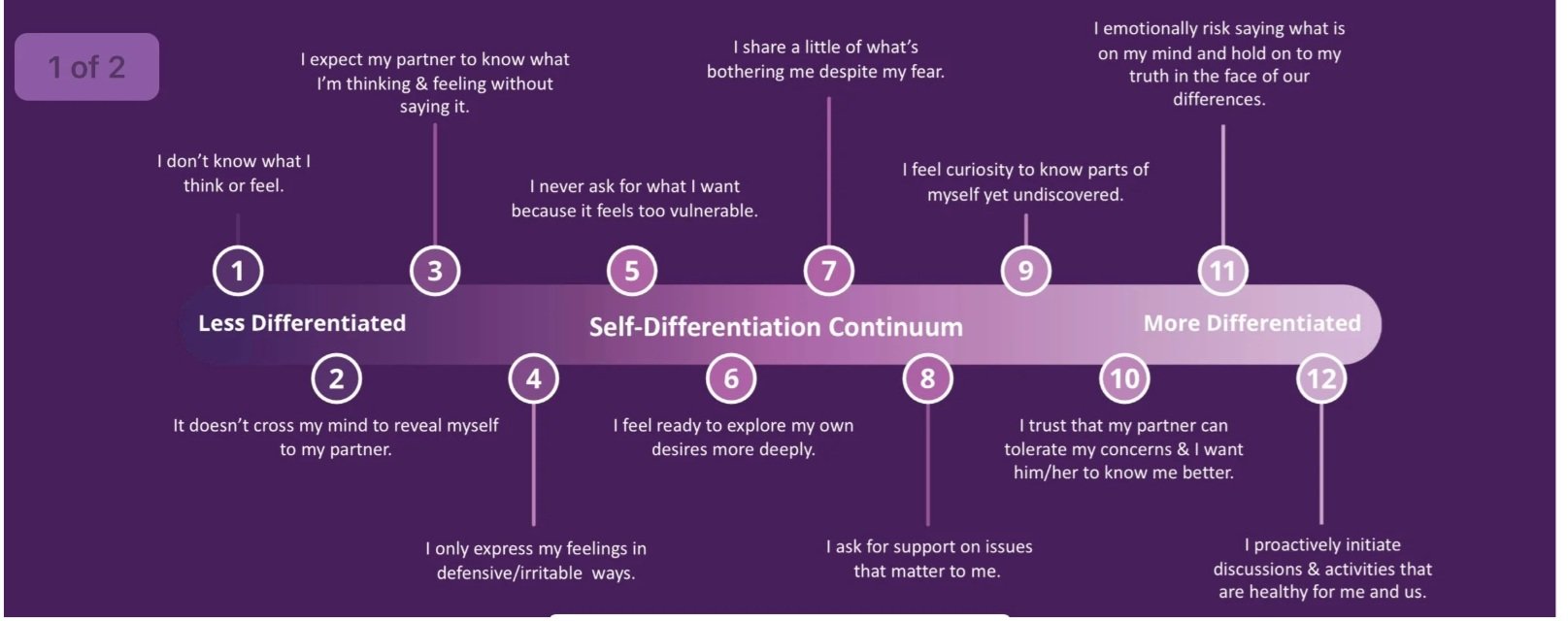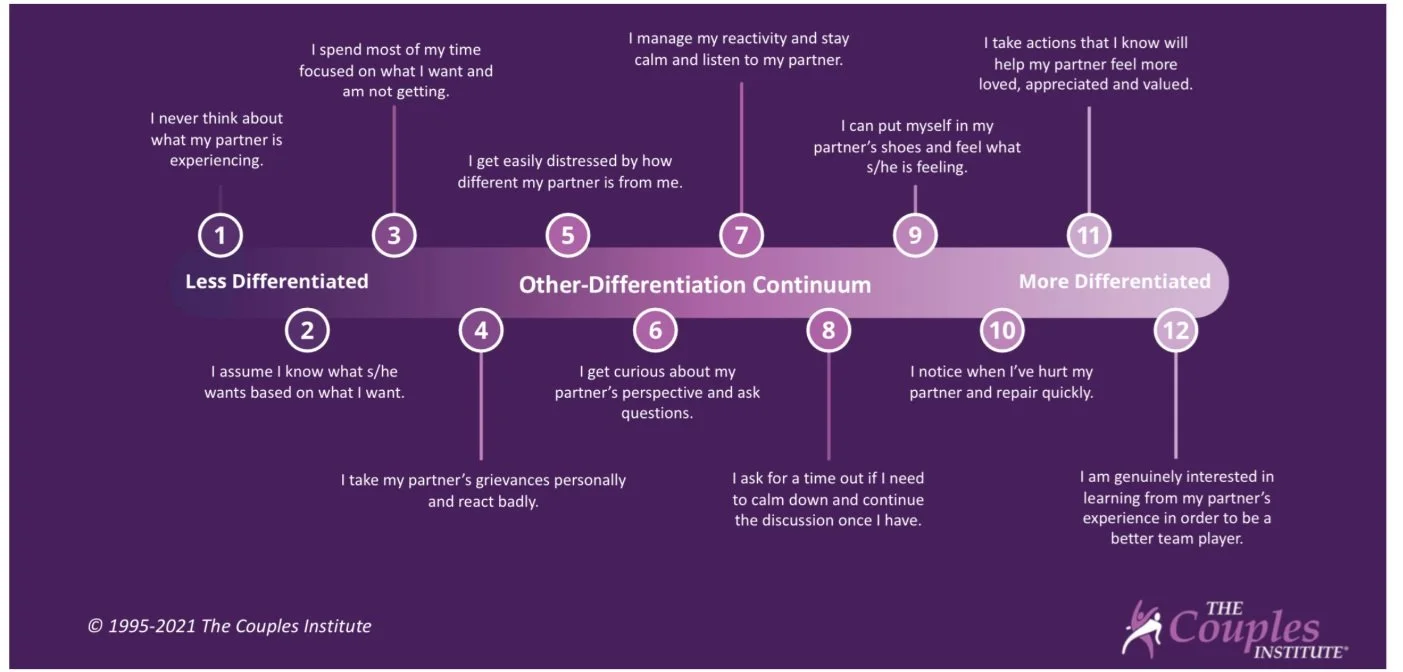Differentiation: The Skill Every Person and Partner Needs
As relational beings - whether in romantic, familial, or professional relationships - it’s easy to fall into the habit of keeping the peace. We may prioritize harmony, agreement, or even self-sacrifice in order to maintain connection. But when we consistently set aside our own needs, preferences, and beliefs to avoid conflict, we risk losing touch with ourselves. Over time, this can lead to resentment, emotional disconnection, and a lack of authenticity in our relationships. Deep, sustained connection doesn’t come from a place of fully merging with others, but stems from feeling secure and grounded in what feels most true for ourselves. Cue the skill we all need to support that self-trust, confidence and security...and one that makes a huge impact in our relationships.
What Is Differentiation?
Differentiation is the ability to:
Know what we think, feel, want, and believe - separate from what others think, feel, or expect.
Confidently communicate those things clearly, even when it's uncomfortable.
Stay grounded and open when someone shares thoughts or emotions that challenge our own.
Differentiation allows us to stay connected, to ourselves and also to others. It requires being secure and grounded within ourselves, and trusting our capacity to stay present while holding the tension of differing perspectives, unmet needs, or uncomfortable emotions.
Differentiation Matters
Practicing differentiation helps us build deeper, more resilient relationships – starting with ourselves. It begins with a commitment to truly knowing who we are: exploring our own thoughts, emotions, values, needs, and desires with curiosity and honesty. When we understand what’s happening inside us - what we feel, what we believe, what we hope for – we feel in sync and can:
Explore ourselves with depth and honesty
By slowing down and tuning in, we begin to notice what we truly think and feel - separate from what others expect, want, or need from us. We can name our emotions, recognize our patterns, and clarify our core values and boundaries. This inner clarity becomes the foundation for every meaningful connection we have.
Make thoughtful, authentic decisions
Instead of reacting out of habit, fear, or people-pleasing, we begin to respond with intention. Decisions reflect our actual beliefs and priorities - not just short-term comfort or external pressure. More authenticity = less second-guessing and regret later.Set healthy, flexible boundaries
Differentiation allows us to set boundaries that reflect both our needs and our values - without guilt, defensiveness, or over-explaining. It’s less about shutting others out and more about staying rooted in who we are while staying open to relationship.*Anyone who has done therapeutic work with me has heard: Boundaries are not things we require of others in order to make them respect us - they are the intentional ways we care for ourselves and are our responsibility. Healthy boundaries are about how we show up, protect our own well-being, and stay accountable to our values, regardless of how others respond…and often – in the midst of how others respond.
Deepen emotional intimacy
When we share from a place of grounded self-awareness, and invite others to do the same, we create space for deep connection. Differentiation helps us stay vulnerable without becoming emotionally fused, and open without losing ourselves.Navigate tough conversations without escalating or shutting down
With practice, we learn to stay steady in conflict. We can tolerate discomfort, hear hard truths, and stay engaged - without collapsing, attacking, or disappearing. This kind of emotional regulation is truly a superpower.
Differentiation in Action
Check out this example:
Individuation (less relational):
“I’ve decided to go back to school. I need this for my career. I would like you to support me.”
*This stance reflects individuation because it centers the individual's needs and desires without inviting dialogue or considering the impact on the relationship - it's focused on self-direction, not shared understanding.
Differentiation (relational):
“I’ve been thinking about going back to school, and I know it’s a decision that impacts all of us. I’d love to share more, and I really want to hear your thoughts, too. Ideally, we can make a plan together that works for everyone.”*This reflects differentiation because it maintains a strong sense of self - sharing personal thoughts and desires, while also making room for the relationship. It acknowledges the impact of the decision on others, invites open dialogue, and expresses a willingness to co-create a path forward. The goal isn't control or consensus, but mutual understanding and collaboration. It’s a practice of staying grounded in our own truth while remaining emotionally connected and curious about the other person’s experience.
There are a few ways of describing the concept of self-differentiation and other-differentiation, but I love these images taken from Don Elium Psychotherapy’s page that highlight The Couples Institute continuum description of the two ideas.
Three Aspects of Differentiation
Knowing Ourselves
Can we name our thoughts, feelings, and preferences without blending into others’ expectations or emotions?Expressing Independent Truths
Can we share our needs, beliefs, or desires clearly and calmly - even when it feels vulnerable?Hearing Someone Else’s Truth
Can we stay present and open when someone shares something difficult or different from our perspective?
All three parts take time and practice. They involve building emotional awareness, managing reactivity, and learning how to stay steady even when things get uncomfortable.
A Few Questions to Reflect On:
Can you tell what you want - or do you rely on others to decide?
What holds you back from speaking up?
How do you react when another person has a different opinion or need?
Are you able to listen without rushing to fix, defend, or withdraw?
Differentiation is a developmental process. As we build these skills, our relationships become deeper, more honest, and more resilient.
If you’re curious about how to develop differentiation in your own life and/or relationship(s), working with a counselor can help you explore and build these vital skills.
Resources:
Couples Institute. (n.d.). Couples therapy training, tools & CE for professionals. https://www.couplesinstitute.com
Elium, D. (n.d.). Couple development scale on differentiation spectrum [Infographic]. Don Elium Psychotherapy. https://www.don-elium-psychotherapy.com/differentiation-spectrum


